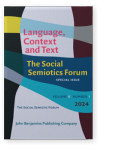References
Bandura, Albert. 2016. Moral
disengagement: How people do harm and live with themselves. New York: Worth Publisher.
Bartlett, Tom. 2017. Positive
discourse analysis. In John Flowerdew & John E. Richardson (eds.), The
Routledge handbook of critical discourse
studies, 133–147. London & New York: Routledge. 

Bodie, Graham, Debra L. Worthington & Zenebe Beyene. 2023. Listening,
community engagement, and peace building. In Graham Bodie, Debra L. Worthington & Zenebe Beyene (eds.), Listening,
community engagement, and peacebuilding: international
perspectives, 1–10. New York, NY: Routledge. 

Curtin, Deane. 2022. Compassion
and being human. In Carol J. Adams & Lori Gruen (eds.), Ecofeminism:
Feminist intersections with other animals and the
earth, 69–87. London: Bloomsbury Academic.
Dalai
Lama [Tenzin Gyatso]. 2011. Beyond
religion. Houghton Mifflin Harcourt. Available at: [URL] (Accessed: 15 October 2022).
Daneš, Frantisek. 1974. Functional
sentence perspective and the organization of the
text. Prague: Academic.
Educational Services
Team. 2016. Certification Preparation Packet
(CPP), New York: Center for Nonviolent Communication.
Fries, Peter. 1983. On
the status of Theme in English: Arguments from discourse. In Janos Petofi and Emel Soer (eds.), Micro
and macro connexity of
texts, 116–152. Hamburg: Buske.
Fries, Peter. 1995. Patterns
of information in initial position in English. In Peter Fries & Michael Gregory (eds.), Discourse
in society: Systemic functional perspectives, meaning and choice in language: Studies for Michael
Halliday, 47–66. Norwood: Ablex Publishing Corporation.
Fuchs, Thomas & Sabine Koch. 2014. Embodied affectivity: On moving and being moved. Frontiers in Psychology 51. 1–12.
Gendlin, Eugene. 2007. Focusing. New York: Bantam.
Halliday, M. A. K. 1994. An
introduction to functional grammar. London: Edward Arnold.
Halliday, M. A. K. 2002. Linguistic
studies of text and
discourse. London: Continuum.
Halliday, M. A. K. & Ruqaiya Hasan. 1985. Language,
context and text: Aspects of language in a social-semiotic
perspective. Geelong: Deakin University Press.
Halliday, M. A. K. & Christian M. I. M. Matthiessen. 1999. Construing
experience through meaning: A language-based approach to
cognition. London: Continuum.
Halliday, M. A. K. with Christian M. I. M. Matthiessen. 2004. An
introduction to functional grammar (3rd
edition). London: Hodder Education.
Hughes, Jessica. 2018. Progressing
Positive Discourse Analysis and /in Critical Discourse Studies: Reconstructing resistance through progressive discourse
analysis. Review of
Communication 18(3). 193–211. 

Kahneman, Daniel. 2011. Thinking,
fast and slow. London: Penguin Random House.
Kann, Trevor. 2017. Measuring
linguistic empathy: An experimental approach to connecting linguistic and social psychological notions of
empathy. PhD dissertation. University of California, Los Angeles.
Knight, Naomi. 2010. Laughing
our bonds off: Conversational humour in relation to affiliation. PhD
dissertation. University of Sydney, Sydney.
Kress, Gunter. 2000. Design
and transformation: New theories of meaning. In Bill Cope & Mary Kalantzis (eds.), Multiliteracies:
Literacy learning and the design of social
futures, 153–161. London: Routledge.
Macquarie Dictionary (2nd
edition). 1996. Sydney: Macquarie University
Martin, J. R. 2002. Blessed
are the Peacemakers: Reconciliation and evaluation. In Christopher N. Candlin (ed.), Research
and practice in professional
discourse, 187–227. Hong Kong: City University of Hong Kong Press.
Martin, J. R. 2004. Positive
Discourse Analysis: Solidarity and change. Revista Canaria de Estudios
Ingleses 491. 179–200.
Martin, J. R. & Peter White. 2005. The
language of evaluation: Appraisal in English. New York: Palgrave Macmillan. 

Moore, Alison Rotha. 2019. Language and
medicine. In Geoff Thompson, Wendy Bowcher, Lise Fontaine & David Schönthal (eds.), Cambridge
handbook of systemic functional
linguistics, 651–688. Cambridge: Cambridge University Press. 

Moulton, Liz. 2007. The
naked consultation: A practical guide to primary care consultation
skills. Abingdon: Radcliffe.
Peyton, Sarah. 2017. Your
resonant self. New York: Norton & Company.
Piasecky, Melissa. 2003. Clinical communication handbook. Oxford: Blackwell Science.
Pounds, Gabrina. 2011. Empathy
as ‘appraisal’: A new language-based approach to the exploration of clinical empathy. Journal
of Applied Linguistics and Professional
Practice 7(2). 139–162. 

Pounds, Gabrina. 2012. Enhancing
empathic skills in clinical practice: A linguistic approach. Connections, emotions, empathy: How do we conceptualise and use
affect and emotions in qualitative health research. Special Issue
of International Journal of Work Organization and
Emotion 5(2). 114–131. 

Rock, David. 2009. Your
brain at work. New York: Harper Collins Publishers.
Rogers, Carl R. 1951. Client-centered therapy: Its current
practice, implications and
theory. London: Robinson.
Rogers, Carl R. 1980/1995. A way of
being. Boston: MA: Houghton Mifflin.
Rosenberg, Marshall. 2015. Nonviolent
communication: A language of life (3rd
edition). Encinitas: Puddle Dancer Press.
Schmidsberger, Florian & Henriette Löffler-Stastka. 2018. Empathy
is proprioceptive: the bodily fundament of empathy – a philosophical contribution to medical
education. BMC Medical
Education 18(69). 69–76. 

Silverman, Jonathan, Suzanne Kurtz and Juliet Draper. 2005. Skills
for Communicating with Patients (2nd
edition). Abingdon: Radcliffe.
Stenglin, Marie. 2004. Packaging
curiosities: Towards a grammar of three-dimensional space. PhD
dissertation. University of Sydney, Sydney.
Stibbe, Arran. 2014. An ecolinguistic approach to critical discourse studies. Critical Discourse Studies 11(1). 117–128.
Thomson, Elizabeth A. 2001. Exploring the textual
metafunction of Japanese: A case study of selected written texts. PhD
dissertation. University of Wollongong, Australia.
van der Kolk, Bessel. 2014. The
body keeps the score: Mind, brain and body in the transformation of
trauma, London: Penguin Random House.
Velasco, Elena Rey, Hanne Sæderup Pedersen, & Timothy Charles Skinner. 2022. Empathy
‘appraisal’ and Systemic Functional Linguistics for patient cues’ analysis in asynchronous health interactions: A new coding
tool development. (Preprint). 

Watson, Olivia. 2012. The
language of clinical empathy: Modelling affiliation in doctor-patient communication. BA
(Hons.) dissertation. The University of Sydney, Australia.
Witty, Marjorie C. 1990. Marshall
Rosenberg. PhD dissertation. Northwestern University, Illinois.
